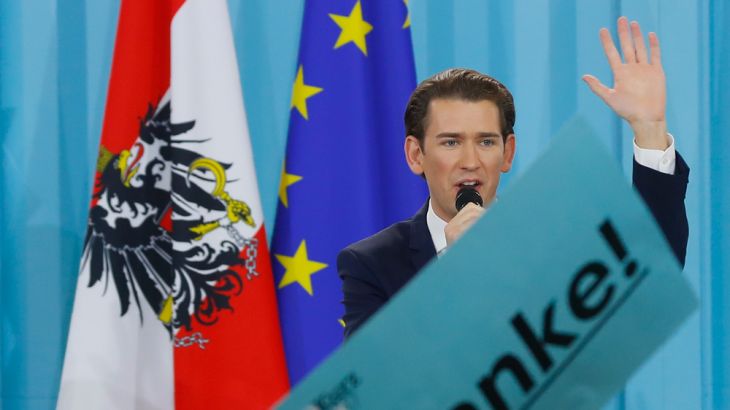Who is Sebastian Kurz, Europe’s youngest leader?
Sebastian Kurz and the OVP party won Austria’s vote after the young politician steered the party further right.

At 31 years old, Sebastian Kurz is set to become the world’s youngest leader.
The conservative People’s Party (OVP) leader is poised to be the new Chancellor of Austria. Despite his young age, he already has significant political experience.
Keep reading
list of 4 itemsCroatians vote in election pitting the PM against the country’s president
Solomon Islanders vote in election that could shape ties with China
Analysis: Ruling party errors give Turkey’s opposition hope for future
According to projections, OVP won around 30 percent of the vote.
In 2013, he was appointed Europe’s youngest-ever foreign minister. At 27 years old, he hosted talks between Iran, the United States, China, Russia, Germany, France and the UK on the nuclear deal. In 2015, the landmark agreement was signed in Vienna.
He has steered the OVP further to the right. During the refugee crisis, he called for stricter border controls in Europe to discourage refugees from fleeing to Europe. He introduced laws preventing foreign organisations from financially supporting Austrian mosques, and said Muslims in the country should only be allowed government-approved German language Qurans. And he backed the “burka ban“, which prevents people from wearing a veil that covers the face in public.
In essence, Kurz has positioned the OVP close to the far-right Freedom Party of Austria (FPO).
Refugees, he has promised, would not be allowed to receive benefits from the state unless they have lived in Austria for five years.
Before the October 15 election, he vowed to halt the influx of people fleeing war and persecution.
The OVP party is expected to rule with either the far-right FPO or the centre-left Social Democratic Party of Austria.
How did Kurz get here?
Kurz’s was an eager member of the OVP’s youth wing. Having helped the party grow, he rose through the ranks all the way to foreign minister.
At his own request, his portfolio would include managing integration. This led to him introduce the so-called “Islam Act” in 2015, which put restrictions on foreign money supporting Austrian mosques in an attempt to curb a rise in so-called “political Islam”.
Kurz has been likened to other young, charismatic leaders such as Emmanuel Macron of France and Justin Trudeau of Canada. However, Kurz’s politics overall are far more right-wing than the mostly liberal agendas of his French and Canadian counterparts.
In May 2017, Kurz was appointed as acting party leader of the OVP after the unexpected resignation of Reinhold Mitterlehner. Two months later, Kurz was officially elected as party leader, and the party quickly rose from the third spot in the polls to winning elections.
Why did he win?
Kurz has worked towards creating a new, right-wing image that uses moderate language in an attempt to appeal to both left-wing and far-right voters.
He rebranded the party, renaming it “The New People’s Party” while campaigning that it was “time for something new”.
His main campaign message was to stop illegal immigration into Austria. As foreign minister, he played an important role in 2016 in closing down the Balkan route for refugees flowing into Europe.
During a campaign rally, Kurz said: “I can also promise today that we will end illegal migration to ensure more order and security in Austria.”
He wants to slash unemployment benefits for asylum seekers and workers from the EU, and reduce government’s aid to refugees. He also promised to stop tax increases.
During the campaign, Kurz beat the increasingly popular far right at its own game.
“The OVP is usually seen as a centre-right party, but it has taken over some of the arguments and issues from the FPO and presented them in a more moderate way,” Anton Pelinka, a professor of nationalism studies at the Central European University, told Al Jazeera. “The style is different but the substance is not.”
How do Muslims feel?
Concerned.
“What happens after this election result is important,” Carla Amina Baghajati, spokeswoman for the Austrian Islamic Religious Authority, told Al Jazeera.
“Anti-Islamic propaganda … very much fuelled this election campaign. This is an opportunity to leave the emotional way behind us and get into a more pragmatic dialogue.
“We should be concerned about this result, but nevertheless, we should also be aware that our democracy is strong and our constitution protects us.”
What will Austria’s government look like?
Kurz will now have to form a coalition with either the FPO or SPO, meaning Austria could take a turn further to the right or it could go back to the status quo of a OVP/SPO government.
Not all votes have been counted, and it is unclear as of yet which will be the second-biggest party. However, polling before the election showed the far-right FPO as the big favourite to join Kurz’s OVP in a coalition government.
The two parties formed a government between 2000 and 2007, leading to European sanctions because of the FPO’s far-right views.
“People aren’t afraid of sanctions any more. It was an exceptional situation then, [but] now we have a completely different political environment, not only in Austria but in almost all European countries, there is a big right-wing presence in politics,” Christoph Prantner, a senior editor at Austria’s Der Standard newspaper, told Al Jazeera. “We have moved to a new normality when it comes to these kinds of issues.”
Although the OVP and the SPO have a long history of ruling the country, one of the reasons the OVP is successful because it has moved away from the SPO and moved closer towards the far-right.
“People are sick and tired of the grand coalition government, and the FPO put their fingers on issues people cared about during this election,” Pranther said.